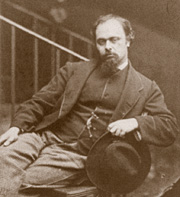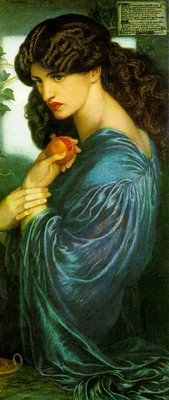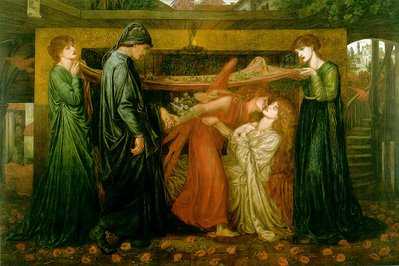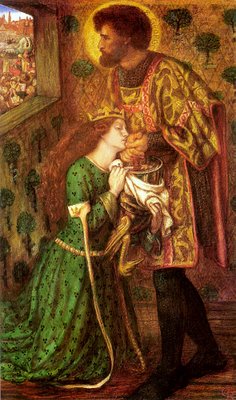 Dante Gabriel Rossetti (1828-1882) was an English Pre-Raphaelite painter and poet. The son of Italian exiles from Naples, he was born and raised in London. Rossetti was trained at King's College and briefly at the Royal Academy. Dissatisfied with Academic norms, he left to become a founding member of the Pre-Raphaelite Brotherhood along with William Holman Hunt and John Everett Millais. Married to studio model Elizabeth Siddal after a ten year engagement, his marriage ended tragically within two years after her overdose on morphine. Though prosperous and successful, he battled depression throughout his life, especially in his last years and a savage public debate with poet Robert Buchanan.
Dante Gabriel Rossetti (1828-1882) was an English Pre-Raphaelite painter and poet. The son of Italian exiles from Naples, he was born and raised in London. Rossetti was trained at King's College and briefly at the Royal Academy. Dissatisfied with Academic norms, he left to become a founding member of the Pre-Raphaelite Brotherhood along with William Holman Hunt and John Everett Millais. Married to studio model Elizabeth Siddal after a ten year engagement, his marriage ended tragically within two years after her overdose on morphine. Though prosperous and successful, he battled depression throughout his life, especially in his last years and a savage public debate with poet Robert Buchanan. This is Prosepine (1874) at the Tate. You may notice that most of Rossetti's female figures look almost identical. This was not the same model, but the artist's effort through the years to cultivate what he saw as the ideal in feminine beauty. Accompanying this painting, Rossetti wrote:
This is Prosepine (1874) at the Tate. You may notice that most of Rossetti's female figures look almost identical. This was not the same model, but the artist's effort through the years to cultivate what he saw as the ideal in feminine beauty. Accompanying this painting, Rossetti wrote:Unto this wall, - one instant and no more
Admitted at my distant palace-door
Afar the flowers of Enna from this drear
Dire fruit, which, tasted once, must thrall me here.
Afar those skies from this Tartarean grey
That chills me: and afar how far away,
The nights that shall become the days that were.
Afar from mine own self I seem, and wing
Strange ways in thought, and listen for a sign:
And still some heart unto some soul doth pine,
O, Whose sounds mine inner sense in fain to bring,
Continually together murmuring) --
'Woe me for thee, unhappy Proserpine'.
 Dante's Dream at the Time of the Death of Beatrice (1871) at the Walker. Rossetti's father was a professor of Italian and expert on the works of Dante, and his son was so fascinated by the Italian bard that he changed his middle name of 'Dante' to his first name. Dante fell in love with the girl Beatrice when he was nine and she was eight, and devoted much of his life to composing romantic sonnets in her honor.
Dante's Dream at the Time of the Death of Beatrice (1871) at the Walker. Rossetti's father was a professor of Italian and expert on the works of Dante, and his son was so fascinated by the Italian bard that he changed his middle name of 'Dante' to his first name. Dante fell in love with the girl Beatrice when he was nine and she was eight, and devoted much of his life to composing romantic sonnets in her honor. In addition to oils, Rossetti also worked with watercolors to create intriguing textures, as seen in this depiction of Princess Sabra washing the hands of St. George after he slew dragon, 1862 at the Tate.
In addition to oils, Rossetti also worked with watercolors to create intriguing textures, as seen in this depiction of Princess Sabra washing the hands of St. George after he slew dragon, 1862 at the Tate.

2 comments:
He also wrote some of the nicest English translations of Francois Villon's poetry.
I didn't know that. Translating poetry isn't easy.
Post a Comment